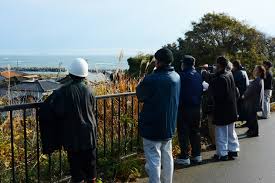TOKYO, (MILLAT+APP/AFP): A powerful 6.9-magnitude
earthquake hit northeast Japan on Tuesday, sparking panic and triggering a
tsunami including a one-metre (three-foot) wave that crashed ashore at the
stricken Fukushima nuclear power plant.
National broadcaster NHK urged residents to “flee immediately” to
higher ground, reminding viewers to heed the lessons of the “Great East Japan Earthquake”.
A massive undersea quake with a magnitude of 9.0 that struck in March
2011 unleashed a tsunami that left more than 18,500 people dead or missing. It sent three reactors into meltdown at the Fukushima Daiichi power plant in one of the world’s worst nuclear disasters.
An official from plant operator TEPCO told a news conference that a
one-metre wave had hit the coast at the facility, but a company spokesman told AFP there were no reports of damage.
About a dozen other waves were recorded elsewhere on the northeast
coast, according to the Meterological Agency, but they were smaller than initial warnings of waves as high as 3.0 metres.
The biggest, measuring 1.4 metres, hit the port at Sendai north of
Fukushima, but officials said there were no reports of damage there.
NHK aired rolling coverage of the earthquake, with the words
“Tsunami! Flee!” in white lettering over a bright red band on the screen.
The Meterological Agency lifted its final tsunami warning nearly
seven hours after the earthquake struck.
TEPCO earlier reported that a water cooling system at a reactor in
the separate Fukushima Daini facility had briefly stopped, in an automatic
response, but that it was back up and operating.
“The biggest risk now is a case whereby contaminated water is carried
away with the tsunami, which pollutes the environment,” TEPCO’s chief
decommissioning officer Naohiro Masuda told reporters, of the situation at
Fukushima Daiichi.
The 2011 disaster sent radiation levels across the Pacific Ocean
soaring and decimated some fishing grounds off Japan’s coast.
The global Scientific Committee on Oceanic Research said in July that
levels were returning to normal but that the seabed and harbour near Fukushima were still highly contaminated.
Residents along the coast heeding evacuation advice clogged some
roads, with a Fukushima newspaper reporting unusual early morning traffic jams in the small city of Soma.
There were no immediate signs of widespread damage and only minor
injuries were initially reported.
Fourteen injuries have been reported throughout the region, including
three elderly women who broke bones when falling or trying to evacuate.
International News
Strong quake hits Japan, triggers Fukushima tsunami
